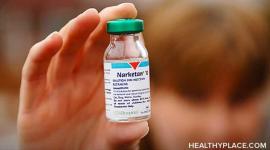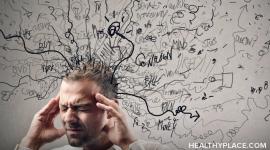What Causes Bipolar Depression?

Bipolar depression causes many people to struggle with day-to-day living. For others, it can be episodic, accompanied by periods of mania or hypomania. No two experiences of bipolar disorder are the same, and the causes of bipolar depression are complex and varied. However, genetic, biological and environmental factors can make it more likely that you will develop this condition. Bipolar disorder is characterized by periods of depression and mania or hypomania, but the exact bipolar depression causes aren't always clear.
Bipolar Depression: Causes and Risk Factors
Bipolar depression causes symptoms similar to regular depression, but there is a difference. The essential feature of depression is low mood over a sustained period nearly all day, every day. It is often accompanied by feelings of hopelessness, loss of enjoyment in almost all activities, insomnia, fatigue and suicidal thoughts or actions. To meet the diagnostic criteria of bipolar disorder there should also be a history of manic episodes or hypomanic episodes.
Depression in bipolar disorder is a defining symptom. No one knows exactly what causes bipolar depression – or indeed bipolar disorder itself. However, research has unearthed some risk factors and causes of bipolar depression that are worth noting.
- Genetics: Some studies suggest that there may be a genetic component to bipolar depression. This means that symptoms of bipolar disorder are more likely to emerge if you have a relative with this condition.
- Brain-chemical and hormone imbalances: Neurotransmitter imbalances, along with hormonal problems, appear to play a crucial role in mood disorders such as bipolar.
- Environmental factors: There is some evidence to suggest that people with a history of abuse or trauma may be more at risk of developing bipolar disorder. However, it is unlikely that you or anyone else can “cause” bipolar depression if you are otherwise healthy and there is no genetic history of the disorder.
Triggers and Causes of Bipolar Depression
Some people do not know they have the condition until something triggers their symptoms. The most common triggers of bipolar depression include:
- Periods of high stress: These can include grief, loss or an otherwise traumatic event. Stress can trigger the first episode of bipolar depression or mania in some people.
- Drugs and alcohol: Even a small amount of alcohol can make bipolar depression worse, while recreational drugs can trigger mania.
- Lack of routine: Sticking to a daily routine is a good way to keep bipolar symptoms at bay.
- Conflict: Fighting with a spouse or loved one can trigger a depressive phase in people with bipolar disorder.
- Sleeping too much or too little: Sleeping too little has been known to trigger mania in people with bipolar disorder, while too much sleep can cause bipolar depression.
- Sensory overload: Lights, crowds, loud music and working too much can be triggers for people with bipolar disorder.
- Quitting your medication: If you are being treated for bipolar disorder or depression, you should never stop taking your medication without talking to your doctor. Suddenly stopping an antidepressant or mood stabilizer can trigger symptoms and could have dangerous side-effects.
Do the Causes of Bipolar Depression Even Matter?
The causes of bipolar depression are not always clear-cut. If you think you have bipolar disorder, your doctor will be less interested in what caused your condition and more interested in treating it. That said, your family history will be taken into account.
It can help some people with bipolar disorder to pinpoint the causes of bipolar depression so that they can avoid anything that triggers an episode. Keeping a mood journal or mood diary may come in handy in helping you determine what leads up to a bipolar depressive episode, so you can avoid it in the future.
APA Reference
Smith, E.
(2021, December 28). What Causes Bipolar Depression?, HealthyPlace. Retrieved
on 2025, April 18 from https://www.healthyplace.com/bipolar-disorder/bipolar-depression/what-causes-bipolar-depression



